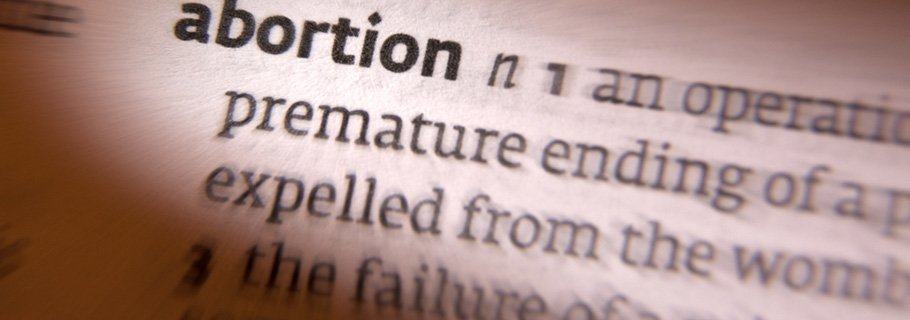Sometimes I know what I believe about a moral issue, but I find my position difficult to explain or defend. It’s not that I don’t have convictions, but that I have difficulty explaining those convictions. I would imagine you sometimes struggle in the same way. I have enlisted an expert to help me look at one of these issues to see how I, as a Christian, can make the case. How can we make a case against abortion? How can Christians convince others that abortion is wrong? I asked my friend André Schutten for help. André is Legal Counsel and Ontario Director at the Association for Reformed Political Action here in Canada.
Arguments against abortion that are based on the Bible are important and simple to make, but ultimately require assent to the authority of God through his Word. Because most people deny such authority, we will leave aside the Biblical arguments and show how you can convince others through science, logic, history and human rights. (Update: I created a slideshow that displays this same information.)
We begin with logic.
Logic
In his excellent little booklet, Pro-Life 101, Scott Klusendorf summarizes the pro-life argument this way: “Elective abortion unjustly takes the life of a defenseless human being. The rationale for that argument is clear and to the point:
- Intentionally killing an innocent human being is a moral wrong.
- Elective abortion is the intentional killing of an innocent human being.
- Therefore, elective abortion is a moral wrong.”
Always bring the discussion back to this question: What is the pre-born?
The issue is not nearly as complex as you might think. All it requires is proving the second premise. If the pre-born child is an innocent human being (premise #2), then elective abortion is always a moral wrong. This means that the only real issue to resolve in the abortion debate is: What is the pre-born? To quote Gregory Koukl, “If the unborn are not human, no justification for elective abortion is necessary. But if the unborn are human, no justification for elective abortion is adequate.” Always bring the discussion back to this question: What is the pre-born?
Science
What does science say about the pre-born entity? (As an aside, some Christians say we should just rely the Bible to tell others that abortion is wrong. They fail to see science for what it is: the law and revelation of God. The laws of gravity are God’s laws of gravity.)
Science tells us conclusively that there are four characteristics common to all pre-born children. (These are worth memorizing!)
- Complete. From the moment of fertilization the pre-born child is complete. All the information that needs to be there is there. It simply needs time to grow.
- Unique. The scientific evidence of DNA proves that the pre-born child is unique and genetically distinct from his or her mother. The pre-born child is not a part of the mother (like an appendix), but a unique entity inside his or her mother.
- Living. The laws of biology tell us that the pre-born child is alive because it is growing, developing, and undergoing metabolism and responding to stimuli.
- Human. The scientific law of biogenesis states that living things reproduce after their own kind. So, dogs beget dogs, cats beget cats, goldfish beget goldfish and humans beget humans. Not parasites or blobs of cells, but humans—complete and unique living human beings.
Science tells us unequivocally that the pre-born child is a complete and a unique living human being.
Science tells us unequivocally that the pre-born child is a complete and a unique living human being.
Back to Logic
So, you’ve looked to science and made the case for the humanity of the pre-born child. But your opponent says, “But the pre-born are different than the rest of us and so they don’t deserve the same protections that you or I do.” While the pre-born are, indeed, different, none of the differences are morally relevant.
Klusendorf has helpfully crafted a mnemonic to remember the differences between born humans and pre-born humans: SLED.
- Size. The pre-born are smaller than born humans, but size doesn’t determine our humanity. Infants are smaller than toddlers, and toddlers smaller than teenagers, but all are human and all are deserving of the law’s protection.
- Level of Development. The pre-born are less developed than born humans, but our level of development doesn’t determine our humanity. Toddlers are less developed than adults, but both are human and both are deserving of protection under the law.
- Environment. The pre-born are certainly in a different place than born humans, but where we are doesn’t determine who we are. If we are human, we deserve the law’s protection no matter where we are.
- Degree of Dependency. The pre-born are more dependent on their mothers than most born humans, but infants are just as dependent. Our dependency doesn’t determine our humanity.
Once we have demonstrated that the pre-born child is morally no different from born humans, we see that any alleged justification to kill a pre-born could only be right if the justification also works for killing a toddler. If you ever get stuck with a tough scenario (say, questions about poverty, privacy, or even conception through rape), “trot out the toddler.” That is, apply whatever justification your opponent has for abortion to the termination of a toddler. If it isn’t justified for the toddler, it shouldn’t be justified for the pre-born child. You can read more about this toddler tactic here.
So, let’s recap: You’ve demonstrated to your opponent that the pre-born child is a complete and unique living human being, despite four differences that are morally irrelevant. What happens if your opponent then says, “Yeah, maybe the pre-born child is a ‘human’, but it isn’t a person.” What then?
History
If someone ever suggests to you that some human beings are not “persons”, challenge them immediately. History is your ally here, because history repeatedly demonstrates that the law will only separate personhood from humanity for nefarious ends. Consider these historical examples:
- 1858, Viriginia Supreme Court: “In the eyes of the law… the slave is not a person.”
- 1881, American Law Review: “An Indian is not a person within the meaning of the Constitution.”
- 1928, Supreme Court of Canada: “The meaning of ‘qualified persons’ does not include women.”
- 1936, German Supreme Court: “The Reichgericht itself refused to recognize Jews… as ‘persons’ in the legal sense.”
- 1997, Supreme Court of Canada: “The law of Canada does not recognize the unborn child as a legal person possessing rights.”
In every case, with the slave, the Indian, the woman, the Jew and the unborn child, science and common sense tells us that they are human. Only the law had the chilling audacity to strip these groups of personhood. If someone is a living human being, then they are a person. A separation between these two can only ever lead to evil.
Human Rights
Quite simply, if you believe in human rights, then you must believe that human rights belong to all humans. And for human rights to have any meaning at all, those rights should begin when the human begins: at fertilization.
The law in Canada (and in certain American states) offers absolutely no protections for the pre-born child. From conception to birth (and sometimes even immediately after birth), a pre-born child can be killed for any reason or for no reason at all. This is a gross violation of human rights. Because Christians recognize pre-born children as our neighbors, made in the image of God, we must be at the forefront of defending their lives. God calls us to nothing less. As Bonhoeffer once said, “Silence in the face of evil is itself evil. God will not hold us guiltless. Not to speak is to speak. Not to act is to act.”
Image credit: Shutterstock










